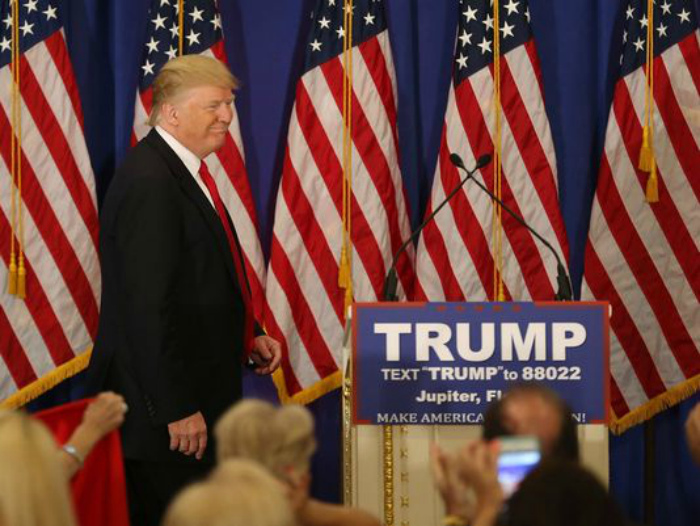Analysis: Trump rolls, as Sanders surprises Clinton in Michigan

He is braced for battle: Donald Trump’s delegate lead was widened by easy victories in the Michigan and Mississippi primaries Tuesday — stoking a furious campaign by the GOP establishment to prevent him from arriving at the Republican National Convention with the nomination clinched. His opponents hope a rare floor fight could award the nomination to, well, just about anybody else.
She had been poised for the prize: Hillary Clinton hoped wins in Michigan and Mississippi would make her all but certain to claim the Democratic presidential nomination she lost to Barack Obama eight years ago. But Vermont Sen. Bernie Sanders narrowly won Michigan in an upset that ensures a longer campaign.
The first primary in the Rust Belt and the last one in the Deep South on Tuesday set the stage for a more crucial and potentially decisive set of contests in both parties next week in the electoral behemoths of Florida and Ohio, as well as Illinois, Missouri and North Carolina.
As the primary season heads toward its final phase, the two front-runners seem to be living in alternate political realities.
The Democratic Party is close to coming to terms, although Sanders’ first-place finish in Michigan could signal unexpected strength in the Ohio and Wisconsin primaries just ahead.
The Republican Party is on the verge of going to war even as Trump is tightening his hold on the nomination.
“I don’t think I’ve ever had so many horrible, horrible things said about me in one week,” Trump said happily at a news conference in Jupiter, Fla., as he thanked his supporters for ignoring pleas by party elders to oppose him.
“This has been a fantastic night,” Sanders told reporters in Miami.
“Hello, Ohio!” Clinton declared at a rally in Cleveland.
Clinton started out on top last year, in such a strong position as the prospective nominee that most of the party’s rising White House hopefuls decided to wait for another time to run. Sanders has caught fire among young people and progressives, but he has struggled to make significant inroads among the African-American voters who are an essential part of the Democratic base.
That’s why Clinton won Mississippi by such a lopsided margin that networks declared her the winner as soon as polls closed, based on surveys of voters as they left polling places. She carried black voters by 8-1.
In Michigan, however, Clinton carried African Americans by 35 percentage points, a wide margin but smaller than in the South; Sanders won whites. She carried Democrats; he carried independents. He won eight in 10 voters under 30; she won seven in 10 of those 65 and older.
Even so, Democratic primary voters in Michigan said either candidate would be acceptable to them: Two-thirds would be satisfied with Clinton as the nominee; seven in 10 would be satisfied with Sanders.
Bernie Sanders acknowledges his supporters at his campaign rally on March 8, 2016, in Miami. (Photo: Alan Diaz, AP)
Among Republicans, divisions are deeper. Nearly half of GOP voters in Michigan would be dissatisfied with Trump as the nominee. In a nationwide NBC News/Wall Street Journal poll released Tuesday, Trump held a narrow 30%-27% lead over Texas Sen. Ted Cruz among likely GOP voters, but in hypothetical head-to-head contests, a majority favored Trump’s rivals over him.
The blustery billionaire started out last year as more of a curiosity than a contender. Before winners had been declared in the Hawaii caucuses late Tuesday, Trump had won 14 of the first 23 nominating contests. In a record-sized field larded with GOP talent — governors, senators and the latest entry in a family dynasty — he unexpectedly has dominated by tapping voter rage at the government and the leaders of both parties.
Three-fourths of Republican primary voters in Mississippi and more than six in 10 in Michigan supported Trump’s proposal to temporarily ban Muslims from entering the USA. Six in 10 Michigan Republican voters wanted a political outsider, and seven in 10 of them voted for Trump.
In Mississippi, he led among white evangelicals, the foundation of Cruz’s intended coalition and his plans to sweep the South, Instead, Trump, a thrice-married New Yorker, has won every state in the Deep South, and this in a party with a Southern base. In his victory statement, he reached out to the party establishment — speaking favorably of House Speaker Paul Ryan and vowing to help elect Republicans to Congress.
All that isn’t convincing any of Trump’s rivals to step aside. Cruz argues he’s the one who has defeated Trump in several states. Ohio Gov. John Kasich says he’s on the rise. Florida Sen. Marco Rubio failed to meet the 15% threshold to win any delegates from either Michigan or Mississippi and was in danger of being shut out in Idaho as well, but is vowing to fight on to the Florida primary next week.
Opposition to Trump is intensifying as he builds a lead in delegates. In the first week of February, just 15% of all GOP TV ad spending was for anti-Trump messages, according to an analysis released Tuesday by Kantar Media CMAG. Last week, that had jumped to 62%. The past three Republican presidential nominees — Mitt Romney, John McCain and George W. Bush — have urged voters to reject him.
Voters don’t seem to be paying much attention to them.
Политика конфиденциальности | Правила пользования сайтом











